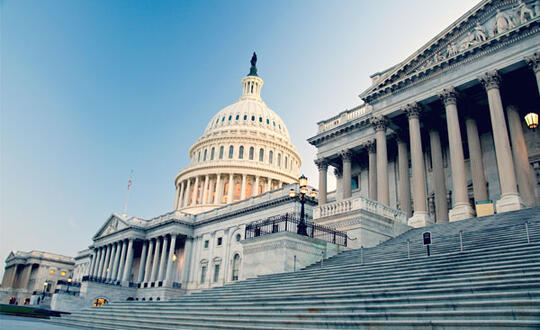Please contact Carri Bennet at [email protected], Richard Cameron at [email protected] or any member of the Womble Bond Dickinson Communications, Technology and Media Team for more information on these matters.
The House of Representatives is scheduled to vote this afternoon on legislation previously passed by the Senate to appropriate funding to re-open the federal government. The legislation is expected to pass, and President Trump has announced that he supports and will sign it. If the legislation becomes law this afternoon or evening, the FCC has announced that it will reopen and resume normal operations tomorrow, Thursday, November 13, 2025. This alert discusses lingering effects on the FCC of the longest-ever lapse of federal government appropriations, previews what to expect over the coming weeks as those effects dissipate, and offers guidance on how to best protect your company’s interests during the weeks and months ahead.
Please in particular be alert to the following considerations concerning your business before the FCC.
- Anticipate changes to the FCC’s provisional reopening timeline published before the shutdown. Under that Public Notice, most filings would be due the day after the FCC reopens, or as soon as Friday, November 14. Given the length of the shutdown and the fact that the FCC took many databases offline, the FCC’s systems are likely unable to accept the necessary volume of backlogged filings on that timeframe. It is therefore likely that the FCC will issue an updated Public Notice establishing a new timeline for accepting filings that were due during the shutdown and in the near term after reopening. After the last long shutdown (2018-2019), the FCC established a multi-tiered system of due dates for filings, providing up to about ten days after reopening for completing most filings.
- Understand whether any filings you intend to submit have deadlines imposed directly by statute. As one common example, Petitions for Reconsideration have a 30-day deadline imposed under Section 405 of the Communications Act of 1934. The FCC can extend or waive deadlines it controls, but has much less flexibility concerning deadlines imposed directly by statute. After the 2018-2019 shutdown, the FCC deemed itself open and able to accept filings required to meet statutory deadlines one day after its actual reopening to account for “the disruption and uncertainty associated with the suspension of Commission activities and the relaunch of Commission filing systems.” We anticipate a similar approach now.
- Anticipate hiccups. Even assuming the FCC creates an extended period for “catch up” filings, the FCC’s electronic filing systems are likely to become overwhelmed by the volume of submissions and may crash. Be patient and, to the extent possible, don’t wait until the last day to make critical filings.
- Communicate and schedule meetings with Commissioners and staff as soon as possible concerning priority items. Much of the FCC staff has been on furlough and not working during the shutdown, meaning that a large portion of the day-to-day work of the agency is severely backlogged. Workload prioritization is likely to be a focus in the days after reopening. If you have a critical technical, policy, public interest, or business need for the FCC to prioritize action on a particular matter, raise its profile and explain the need as soon as you can.
- Understand that transaction consents are likely to be delayed. As the FCC released a separate public notice removing any domestic section 214 transfer of control applications from streamlined processing, any pending transactions will likely be processed first. If you are looking toward a year end closing, filings should be made as soon as possible.
- Keep abreast of rapid developments. Although the FCC has remained partially active during this shutdown, there is likely to be a large volume of catchup activity in the weeks following the reopening. Make sure to keep up with potentially rapid-fire developments as they occur.
- Anticipate the next possible shutdown deadline – it’s sooner than you think. Even if signed into law, the proposal passed by the Senate provides temporary funding through January 30, 2026, when it is possible the FCC will experience a further shutdown. If you need FCC action on critical items, plan to make the necessary filings and schedule any necessary meetings as soon as possible, in order to provide as much time as possible for the Commission to act. During the current shutdown, the FCC departed from its past practice of remaining open using independent sources of revenue to remain open for at least a brief period after a lapse of appropriations. Instead of continuing normal operations across the board, the agency appears to have called upon selected employees to perform “exempted” work funded through these other sources to advance specific priorities, as provided in the agency’s most recent Shutdown Plan. (The FCC’s October and November open meeting agendas, for example, include a robust slate of items that, while important, exceed the scope of excepted activities needed to protect FCC personnel and property.) The FCC may choose to follow a similar approach during future shutdowns, so treat the January 30 date as real.
The Womble Bond Dickinson Communications, Technology and Media Team in Washington, D.C., is closely monitoring all of the latest developments as the FCC and the rest of the federal government reopens. Please feel free to reach out to any of us to discuss any questions or specific areas of concern.
